Fresh Produce
While Israel’s military bombardment of Gaza continues, Hamas’s rocket fire is pushing up prices of fruit and vegetables in Israel, as workers flee.
Israel’s recent and ongoing military assault on the Gaza Strip has once again brought death and destruction to what many commentators were already coining the world’s largest open-air prison.
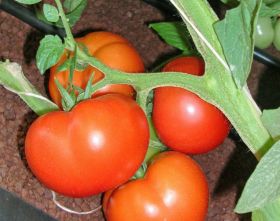
According to Israeli officials, the campaign has been implemented to halt the rocket fire into Israel by Hamas, the organisation that governs Gaza and is labelled a terrorist group by many countries, including Israel, the US, the EU and Japan, although many nations, such as China, Russia, Iran and much of the Arab world, do not.
A report in Globes stated that the rocket fire had led to a jump in prices of certain fruit and vegetables in Israel due to irregular harvesting, as some farmers refuse to work in such conditions.
Wholesale tomato prices have risen by 47 per cent to ILS 6.5-6.8 (€1.40) per kilogram, melons by more than 180% to ILS 5.6-6 (€1.20-€1.30) per kilo.
Cauliflower prices have increased by 130% to ILS 7.6-8 (€1.64-€1.73) per kilogram, while cabbages are up by 46%.
Aharon Bitton, a farmer from Kibbutz Erez, commented: “The workers don’t want to work. The Thai, Bedouin, and Sudanese workers are all fleeing out of fear.”
Farmers from the Ein Yahav-based Yofi Shel Yerakot (Beauty of Vegetables) Cooperative told the Jerusalem Post that vegetables that had not been harvested in time and were therefore over-ripe may have to be sold to the Palestinian vegetable market in the West Bank.
Critics of the latest Israeli attacks argue that these actions stand no hope of bringing peace since they do not address the continuing illegal occupation of Palestinian territory by Israel, nor its illegal blockade on Gaza.
The first shipment of Australian ‘Tiger Fuji’ apples is on way and due to dock in Shanghai on Wednesday
The first container of the Australian striped apple, branded ‘Tiger Fuji’, is due to reach China on Wednesday.
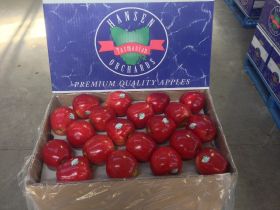
Southern Tasmanian apple grower Andrew Scott from Scott Brothers told Asiafruit he’s keeping his fingers crossed it all goes well when the first container of Tiger Fuji apples reaches Shanghai.
“The trial shipments we sent to Hong Kong last year have been received really well,” said Scott. “So there’s no reason to believe it will be otherwise for the shipment to China.”
The sweet tasting, well-polished apple variety with a deep red colour has a long shelf life, said Scott, meaning it should travel well.
“This is about opening the door for all Australian apple growers, not just Tasmanians,” said Phil Pyke from Fruit Growers Tasmania, adding that Tasmania has been shipping apples to China for some time, albeit some years with much smaller quantities. “Now, we’re getting back into the game.”
“We don’t want to be a one hit wonder,” said Scott. “We want to develop a long-lasting, good quality relationship with importers and marketers to develop a cohesive business.”
Tasmanian Hansen Orchards are exporting the Scott Brothers’ Tiger Fuji, with NPC International taking care of the marketing on the ground in China.
After a trial shipment of Tiger Fuji apples to Hong Kong last year, Hansen Orchards are now planning to pack another 40ft container to Hong Kong on Monday.
The Banana Growers Council is expecting Australian banana production to reach a record high over the past financial year

The Banana Growers Council has predicted a record year for Australian bananas, with total production set to surpass 29m cartons by the end of this financial year, according to ABC Rural.
“These sort of numbers, even a couple of years ago, would have completely destroyed the market,” the council’s Doug Phillips told the ABC, adding that this year market demand has matched supply.
“What we’ve seen this year is relatively reasonable return…the fruit has really flowed through the market quite well. We haven’t seen chronic over-supply.
“The fact we have seen this quantity of fruit flow through the market is testimony to the fact we are getting results through marketing, but it has been backed up with some good-quality fruit as well,” said Phillips.
According to the ABC, this record year of production puts Australia’s banana industry as the leading horticultural industry in the country, an expansion that Phillips said is a challenging but positive one.
Welsh grower Perkin Evans wants the NFU to keep lobbying Brussels to ensure food producers’ tool-boxes aren’t ‘depleted’
Farmers fear Europe is fast becoming an over-regulated environment to operate within, NFU Wales has found.
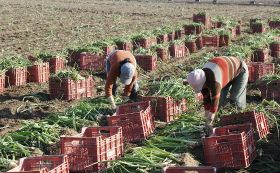
A new campaign by the union, called ‘Healthy Harvest’, has just been launched in response to concerns that already flat-lining UK crop production will go into further decline if Welsh farmers continue to lose access to key plant protection products.
Statistics show that since 2001, half the plant protection products on the market have been lost, and over the next five years, half of what is left could also disappear from the market owing to overzealous regulation, not backed up by sound science.
“Our toolbox as food producers is becoming increasingly depleted, at the very time we need to be stepping up to the challenge of producing more,” said Perkin Evans, chairman of NFU Wales’s Combinable Crops and Horticulture Working Group at the group’s recent meeting.
He added: “Europe is fast becoming an over-regulated environment for farmers to operate within. We are steadily losing our markets to farmers elsewhere in the world, who have better access to more effective means of crop protection and production.
“With global demand for food heading in only one direction, now is certainly not the time to be taking away the tools that we need to be able to produce disease free, high yielding crops, and we need the same access to safe technology as our competitors if we are to have a productive and competitive sector.
“As more and more products get withdrawn, there is simply not the corresponding level of new products arriving on the market to replace them, and the reality is that European requirements to bring a new product to market have become prohibitively expensive and time consuming, leaving farmers and growers with fewer and fewer products to choose from. To make things worse, many manufacturers are decreasing investment in the European market, partly because it is over-regulated.”
Evans believes that as a union, NFU Wales needs to keep lobbying to ensure that both EU and domestic regulators base the control of plant protection products on sound science; something that includes lobbying the EU to move away from its current hazard based approach, and return to a risk-based process.
European potato stocks reportedly at their lowest level in decades, while Belgium reports record production

Potato supplies into Europe, Russia and Ukraine are reportedly running at their lowest level for decades, with domestic production delayed by cold, wet weather and suppliers in traditional spring sources Egypt and Israel reporting lower-than-usual stocks for the time of year.
According to Christoph Hambloch of analyst AMI, problems with the quality and availability of early potatoes in Spain, Italy, Belgium and Germany have complicated matters and depressed overall profitability in the sector, notably as a result of moisture-related disease.
Meanwhile, market prices are said to be rocketing, topping €70 per tonne compared with €50 per tonne at the same time last year.
“The current price trend has been turned on its head,” Hambloch wrote. “Normally prices start to go down at this time of year, but now they are climbing higher and higher.”
In Belgium, local reports suggest potato production area in the region of Wallonia has increased 8.6% this year to 35,535ha, contributing to an overall rise in production to 81,165ha – a new record for the country.
New Zealand is now producing more fruit than it did a decade ago, despite planted area contracting by around a quarter
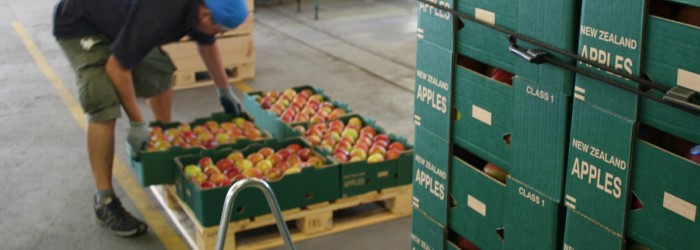
New Zealand is expected to ship around 310,000 tonnes of apples this season – a pleasantly surprising result for the country’s growers during what is an off year in their trees’ biennial bearing cycle.
Last year’s full crop yielded a 12% increase in shipments overseas to 324,684 tonnes, according to industry body Pipfruit NZ, and this year’s export volumes had been expected to fall back in line with a downturn in production to around 480,500 tonnes.
However, exporters had already expressed confidence at the start of the 2014 campaign about the prospects for NZ apples, mainly based on the anticipated demand for smaller-sized fruit in key markets such as the UK and the fact that frosts in Chile and hail in South Africa would mean availability of those sizes was under pressure from the start of the season.
New Zealand’s apple export trade has also been aided by a further increase in demand from the developing Asian market, where volumes sold to China and Hong Kong increased from 15,268 tonnes in 2012 to 21,443 tonnes last year, despite a temporary suspension of shipments in September.
The country’s top five export markets in 2013 were the UK (44,312 tonnes), US (), Netherlands (), Thailand () and Belgium (). A significant proportion of shipments to the Netherlands and Belgium were re-routed to other markets across Europe, with demand boosted by a smaller Northern Hemisphere crop and, again, damage to crops in Chile and South Africa.
Thailand, meanwhile, has emerged as one of the shining examples of successful market diversification: in just five years, it has gone from importing less than 8,000 tonnes of NZ apples to almost 28,000 tonnes in 2013.
Similar dramatic increases have been observed in the UAE, which imported 18,404 tonnes in 2013 – four times the 2008 figure; in India, up from 4,966 tonnes to 14,330 tonnes during the same period; and in Vietnam, now taking around 3,000-4,000 tonnes compared with just 750 five years before.
New Zealand also appears to be reaping the rewards of a sizeable increase in productivity as the sector has consolidated in the post-deregulation era.
Figures released by Pipfruit NZ show that, while planted area for apples has declined by nearly 25% since 2005, production of export-grade fruit is at a similar, if not higher, level now to that seen a decade ago.
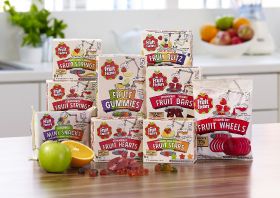
New retailer listing for convenience fruit snacks from prepared company Humdinger
Snack firm Humdinger has won an Asda listing for its branded Fruit Factory potted fruit snacks from 19 May 2014.
The brand is now stocked in all major retailers across the UK.
It will be available in Asda in multipacks consisting of Strawberry, Apple & Orange Fruit Strings, Strawberry Fruit Hearts, Strawberry, Apple & Orange Fruit Stars and Lunchbox Mini Snacks. The pack RRP will between £1.49 and £1.99.
Carl Widdop, brand manager at Humdinger, said the company is looking to expand further during 2014.
“We’re delighted to announce that The Fruit Factory products will soon be available in Asda stores nationwide,” he said. “It’s a great start to the year for the brand to have secured listings in all the UK’s major supermarkets.”
Humdinger distributes dried fruit and savoury snacks under the Humdinger and The Fruit Factory brands, as well as licensed products from Budweiser, Marmite and Vimto.